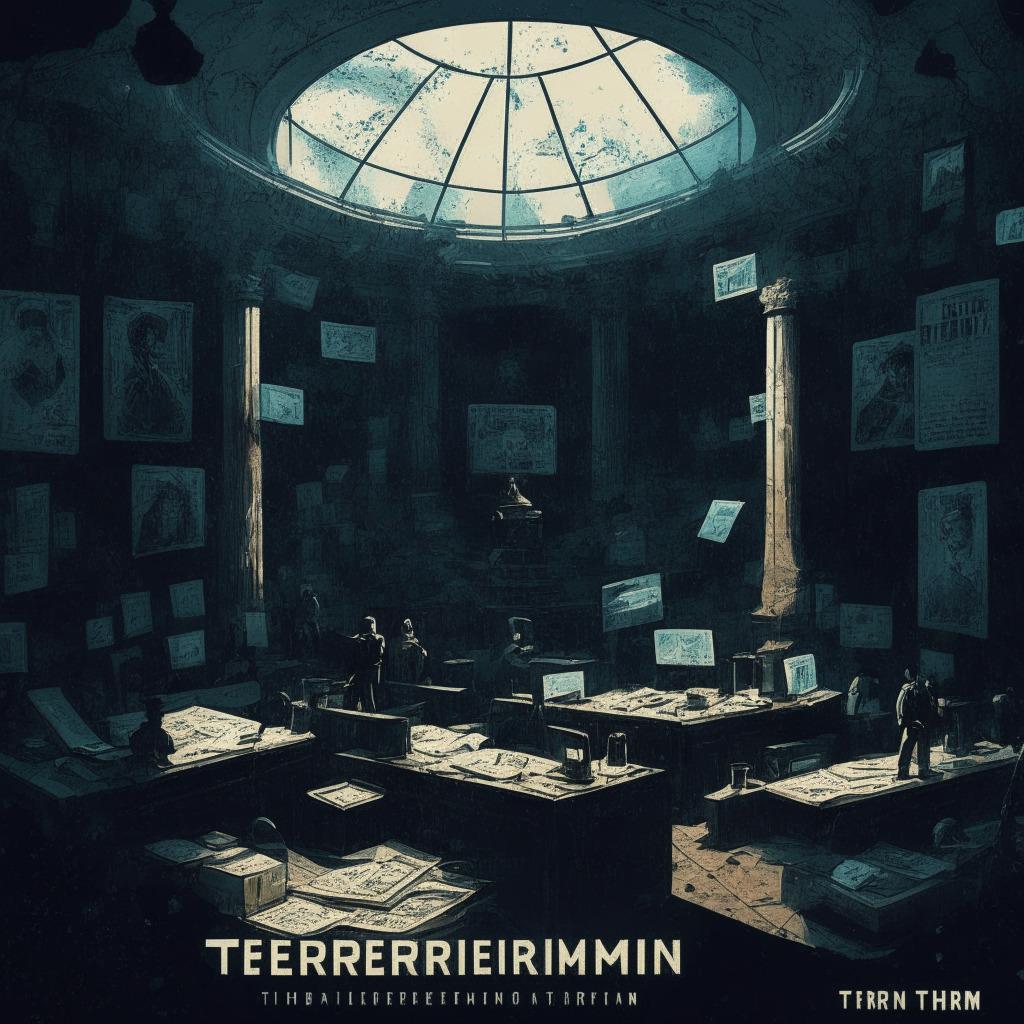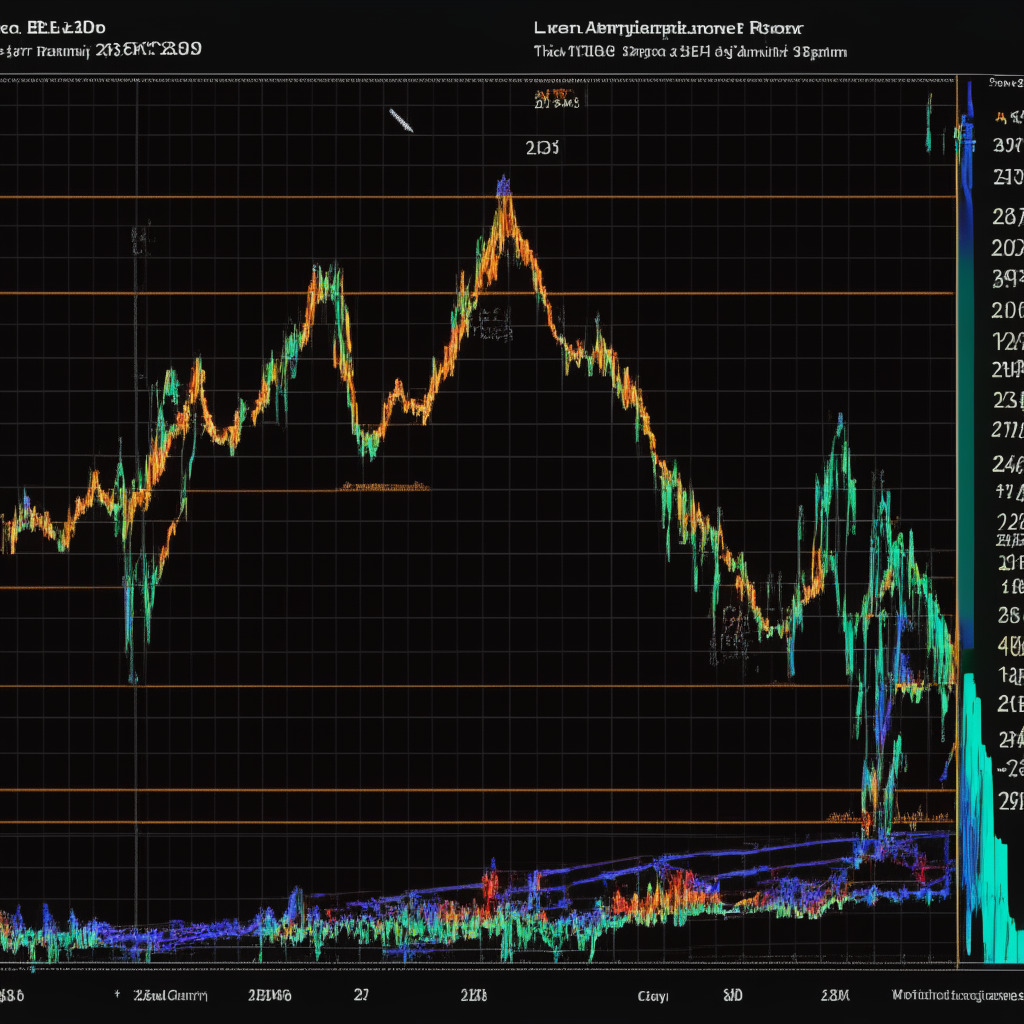Terraform Labs co-founder Do Kwon denies allegations of utilizing forged passports and insists on his innocence. Kwon and former CFO Han were arrested in Montenegro with potentially forged documents following the 2022 Terra ecosystem collapse that led to an extended crypto winter.
Search Results for: EXA
Binance Layoffs and New Hires: Examining the Crypto Industry’s Growth Challenges
Binance.US confirms layoffs amidst SEC investigation, while other crypto firms like Eden Block and Public make strategic hires. Crypto industry sees experienced professionals joining, but also faces legal challenges leading to job losses.
Abra Hit with Emergency Cease and Desist Order: Examining the Accusations and Impact on Crypto
Cryptocurrency investment company Abra faces an emergency cease and desist order from Texas securities regulators, alleging securities fraud and offering investment products to unaccredited investors. With a partially insolvent status, Abra’s future and the wider cryptocurrency industry may face further regulatory scrutiny.
Failed Terra Project’s Legal Fallout: Examining Crypto Fraud Cases & Industry’s Future
Do Kwon, the founder of the failed Terra blockchain project, faces an extended detention in Montenegro amidst South Korea’s extradition request. Kwon is facing eight counts of fraud, including securities, wire, and commodities fraud. The case highlights the potential for similar incidents and raises debates on the balance between market innovation and tighter control to prevent fraud in the crypto space.
Texas Crackdown on Abra: Striking Balance Between Regulation and Innovation in Crypto
The Texas State Securities Board issued an emergency cease and desist order against Plutus Financial, Plutus Lending, Abra Boost, and CEO William Barhydt, due to deceptive practices in offering securities. This case highlights the importance of transparency and accountability in the blockchain and cryptocurrency sectors, while raising concerns about striking a balance between oversight and innovation.
Is Tether’s USDT Stablecoin Under Pressure? Examining Unusual Selling Activity
Speculation mounts that Tether’s USDT stablecoin may be under pressure, with liquidity pools on Uniswap and Curve protocols flooded with USDT sellers. A potential USDT depeg could be catastrophic for the crypto economy, raising concerns over its liquidity and stability amidst growing market share.
Banqruptcy and BitGo Acquisition: Examining Blockchain Security and Trust Amid Legal Dilemmas
Banq’s bankruptcy filing exposes vulnerabilities in the rapidly expanding blockchain industry, while its legal action demonstrates the industry’s commitment to security and trust. BitGo’s potential acquisition of Prime Trust signifies a push towards stronger safety measures amidst concerns of security breaches and trust issues.
Decline in Crypto Trading Volume on Robinhood: Examining Reasons and Market Uncertainty
Robinhood reported a 43% downturn in crypto trading volume in May, with legalization hurdles and market uncertainty contributing to the slump. The removal of three tokens, ADA, MATIC, and SOL, after SEC scrutiny further adds to the decline. Strong regulations and compliance measures are vital as the industry evolves, for both trading platforms and investors.
Bitcoin’s Uncertain Week: Examining Market Volatility, Legal Battles, and Potential Growth
Bitcoin enters an uncertain week with support below $26,000, influenced by legal battles in the US. Key factors to watch include US macroeconomic data, SEC conflicts with exchanges, and legal proceedings involving Coinbase and Binance. Despite the precarious situation, Bitcoin’s strong network fundamentals and potential macro shifts present opportunities for recovery and growth.
Crypto Wealth Shifts Eastward: Examining Regulatory Impacts & Market Volatility
The increasing regulatory actions in the West, especially the US SEC’s lawsuits against Binance and Coinbase, have led to a significant shift in crypto wealth, as the East becomes a haven for those seeking alternatives to stricter regulations. This redistribution of cryptocurrency wealth highlights a divide in perspectives on financial innovation and regulatory oversight, with investors migrating to Eastern markets.
Binance CEOs Face SEC Allegations: Examining the Impact on Crypto Exchanges & Markets
Binance CEO, Changpeng ‘CZ’ Zhao, and Guangying ‘Helina’ Chen face SEC allegations involving billions in customer funds transferred via holding company Key Vision Development Limited. With regulatory scrutiny on the rise, the upcoming June 13th court date may have significant implications for crypto exchange transparency, practices, and regulation.
SEC Lawsuits Shake Crypto Industry: Examining Stand with Crypto NFT & Impact on Advocacy
The SEC’s legal action against Binance and Coinbase has intensified concerns over regulation in the crypto industry. In response, the Stand with Crypto movement was created utilizing NFTs on the Zora platform, advocating for regulatory clarity despite criticisms of virtue-signaling.
Binance Faces Class-Action Lawsuit Over Stolen Crypto: Examining the Implications and Future of Regulation
Binance faces a class-action lawsuit for allegedly profiting from transactions involving stolen cryptocurrency. Plaintiff Michael Osterer claims that Binance failed to verify lawful ownership of 7.2 BTC and 449 ETH stolen from his Coinbase account, and suggests that the exchange willingly facilitates money and cryptocurrency laundering on its platform. The lawsuit could have significant implications for the crypto economy and future regulations.
Meta’s Controversial Release of LLaMA AI: Examining Security Risks and Ethical Implications
U.S. Senators Blumenthal and Hawley criticize Meta’s “unrestrained and permissive” release of AI model LLaMA, fearing its potential misuse in cybercrime and harmful content generation. They question Mark Zuckerberg about risk assessments and mitigation efforts prior to LLaMA’s release, emphasizing the importance of responsible AI development and oversight.
Crypto Interest Decline: Temporary Setback or End of a Trend? Examining Market Sentiments
Cryptocurrency search interest has stumbled to late 2020 levels, with “crypto” at a score of 17 on Google Trends. This decline coincides with lower trading volumes, “Neutral” market sentiment, and a steady Bitcoin value around $28,000. Despite this, overall adoption and interest in digital assets, including decentralized finance, continue to progress.
Atomic Wallet Security Breach: Examining Trust and the Challenge of Ensuring Crypto Safety
Atomic Wallet, with over five million users, suffered a security breach resulting in users losing funds. On-chain investigator ZachXBT is assisting affected individuals. The breach questions the wallet’s security and highlights the challenge of achieving complete security in the decentralized financial landscape.
Ethereum Price Recovery: Can We Expect a $2,000 Milestone Soon? Pros and Cons Examined
Ethereum price formed a bullish morning star candle at a recently breached resistance trendline, suggesting a potential recovery. With market sentiment supporting a bullish recovery and a breakout from the wedge pattern, Ethereum could rise to levels between $2,020 and $2,120. However, uncertainty remains considering the required 30% rally to reach $2,500.
New Mining Investments Amidst 44% Decline in Bitcoin Profits: Examining Resolute Companies
Despite a 44% decline in Bitcoin mining profitability over the past year, companies like CleanSpark continue to expand, with CleanSpark recently purchasing 12,500 Antminer S19 XP units for $40.5 million. As mining difficulty reaches an all-time high, the industry demonstrates resilience and optimism, aiming for greater efficiency and productivity.
Texas Bitcoin Mining Boom: Supportive Legislation and State-Level Tug of War
Texas embraces bitcoin mining as legislators pass supportive bills, SB 1929 and HB 591, solidifying the state’s position as a premier destination for the industry. However, future federal-level regulation remains uncertain, with individual states currently leading policy development.
Ethereum Price Struggles: False Breakout or Recovery Path? Examining Market Trends and Risks
A notable increase in the crypto market on May 28th allowed Ethereum to surpass a descending resistance trendline, indicative of buyers regaining control. However, struggles to maintain above the breached trendline raise concerns about a false breakout scenario and potential decline in Ethereum price.
The Shaky Future of Bitcoin: Examining Market Fluctuations, Adoption, and Crypto Utility
Bitcoin faces a 6.5% monthly drop but maintains a 68% year-to-date gain. To attract more investment, real utility and development must be demonstrated, according to John Wu, president of Ava Labs Inc. Increased network activity, including BRC20 standard Bitcoin Ordinals and NFTs, has impacted transaction fees and network congestion.
Texas Bill Stalling: Implications for Bitcoin Mining and Grid System Sustainability
The Texas SB 1751 bill, aimed at restricting bitcoin miners’ participation in cost-saving grid programs and abolishing tax abatements, has stalled in the state House of Representatives. The stagnation leaves the future uncertain for the burgeoning mining industry in Texas, opening possibilities for further discussions and decision-making regarding the cryptocurrency mining landscape.
Independent Examiner Debate in FTX Bankruptcy: Legal Dispute, Costs & Implications
A U.S. District Judge referred a motion concerning the appointment of an independent examiner for FTX’s bankruptcy to an appellate court. The case raises questions about the need for an independent examiner in crypto exchange bankruptcies, potential costs, and implications for future similar cases.
Russia’s Shift Towards Private Crypto Exchanges: Examining Implications, Benefits, and Drawbacks
Russia abandons plans for a government-operated cryptocurrency exchange, opting instead to create regulations allowing the private sector to manage exchanges. This reflects the contradictory relationship autocratic governments have with decentralized digital assets while highlighting the inevitability of cryptocurrency adoption and the need for effective regulations.
Crypto Bills in Limbo: Texas Legislature’s Inaction and Its Impact on the Industry
Texas’ regular legislative session closed, leaving cryptocurrency bills unresolved for potentially 19 months. One notable bill, Texas Senate Bill 1751, aimed to eliminate tax breaks for miners and impose stricter energy usage control. Another bill, House Bill 1666, seeks to mandate cryptocurrency exchanges to hold adequate reserves for customer obligations.
Texas Crypto Conundrum: Examining Senate Bill 1751 and Implications for Blockchain Future
The debate surrounding Texas’ Senate Bill 1751 highlights the complexities in regulating cryptocurrencies, emphasizing the need for a balanced regulatory environment that supports innovation, growth, and protects interests while addressing concerns like fraud and money laundering in the crypto industry.
Texas Crypto Regulations: Unresolved Bills, Mining Rivalry, and Governor Abbott’s Choices
Texas lawmakers leave crucial crypto regulation bills unresolved. Senate Bill 1751, restricting cryptocurrency mining firms, is now unlikely to be addressed until 2025. However, House Bill 1666 and House Bill 591, await Governor Greg Abbott’s action, potentially shaping Texas’ approach towards digital assets for years to come.
Navigating the Complex World of Crypto Insurance: Examining Solutions and Challenges
This article explores the complexities and high risks involved in insuring the crypto industry. It highlights the challenges faced by insurance providers, such as assessing over 2,000 variables, managing private keys, and proving the legitimacy of individual claims. Adopting traditional insurance sector lessons and blockchain technology could help promote industry growth and make insurance more accessible.
Gemini and Genesis Battle SEC Lawsuit: Examining the Crypto Regulatory Landscape and User Protection
Gemini and Genesis move to dismiss a SEC lawsuit alleging their Earn product offers unregistered securities. As users face difficulties, conflict between Gemini and parent Digital Currency Group adds to crypto industry’s regulatory uncertainty. Gemini plans a UK base amid growing US regulatory challenges.
TradeBlock’s Demise: Examining Regulatory Challenges and Crypto Industry Growth
TradeBlock, a subsidiary of Digital Currency Group, is reportedly closing down due to factors including the crypto winter and challenging US regulatory environment for digital assets. This highlights the need for regulators and market participants to find common ground, balancing regulatory requirements with industry growth to tap into blockchain and cryptocurrency opportunities.
Bitcoin Mining: Savior or Strain on Texas Power Grid? Pros, Cons & the Ongoing Debate
A recent paper suggests that Bitcoin mining loads can help mitigate power shortages in Texas if managed correctly. The state faces concerns about the grid’s ability to handle mining activities. Financial incentives and location strategies can enhance grid-supporting capabilities and alleviate reliability concerns, while legislation and collaboration are needed for sustainable solutions.
Bitfinex and OrionX Boost Crypto Adoption in Latin America: Opportunities and Risks Examined
Bitfinex partners with Chile’s leading cryptocurrency exchange, OrionX, to encourage widespread adoption in Latin America and support local education programs. With its growing significance, it’s crucial for Latin America to maintain financial stability and protect users amid expanding crypto market involvement.































